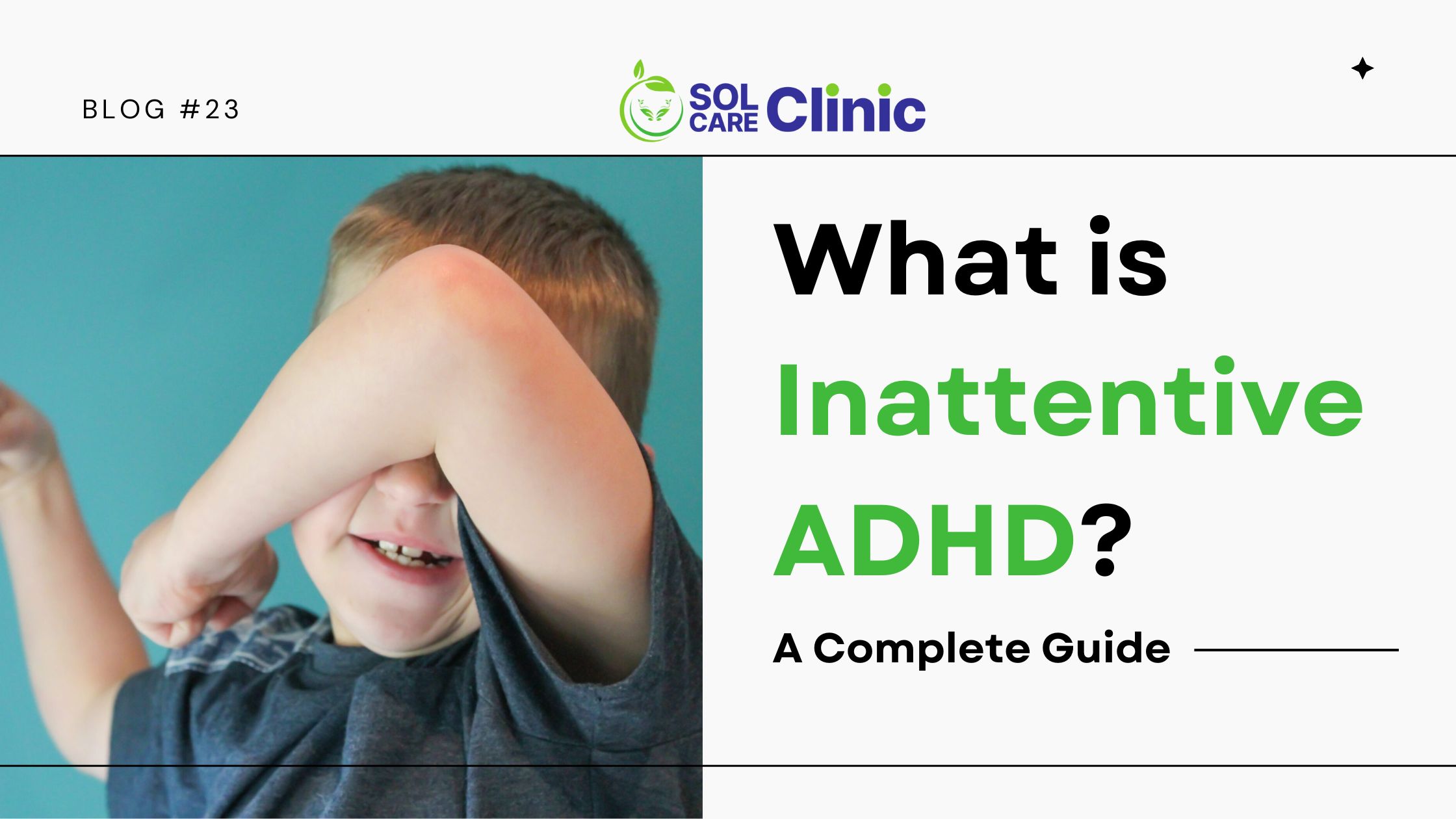ADHD is a neurodevelopmental condition that affects both children and adults. While ADHD is often associated with hyperactivity and impulsivity, the inattentive presentation of ADHD—commonly known as Inattentive ADHD—is characterized by distinct challenges.
Myths about Inattentive ADHD—What’s the reality?
Despite growing awareness, many misconceptions persist about inattentive ADHD.
Let’s debunk some of the common myths and clarify the truths
- Myth: “They’re just lazy”
Reality: Inattentive ADHD is a genuine neurodevelopmental disorder, not a lack of effort. Individuals face difficulties in focus and organization, which can be misinterpreted as laziness.
- Myth: “It’s only a childhood condition”
Reality: ADHD, including its inattentive type, often continues into adulthood, affecting different aspects of life such as work, relationships, and self-management.
- Myth: “Medication fixes everything”
Reality: While medication can assist, a comprehensive management plan—including therapy, lifestyle changes, and support—is essential for long-term success.
What are the symptoms of Inattentive ADHD?
To better understand inattentive ADHD,
Here are its symptoms:
- Difficulty sustaining attention: People usually struggle to concentrate on tasks, especially those that require prolonged mental effort.
- Frequent careless mistakes: Tasks like homework or workplace reports may need to be corrected due to inattention to detail.
- Forgetfulness: Important tasks, appointments, or even daily routines may be forgotten easily.
- Poor organizational skills: Managing time, completing tasks, or keeping belongings in order can be challenging.
- Avoidance of tasks requiring mental effort: Activities that demand sustained focus are often avoided or delayed.
- Easily distracted: External stimuli or even internal thoughts can lead to frequent interruptions in focus.
What are the causes and risk factors of Inattentive ADHD?
The exact cause of ADHD, including its inattentive presentation, is not fully understood. However, research points to a combination of genetic, neurological, and environmental factors.
Key contributors include:
- Genetics: A genetic history of ADHD or other mental health disorders increases the likelihood of the condition.
- Brain structure and function: Differences in brain regions responsible for attention and self-regulation have been observed in individuals with ADHD.
- Prenatal and early life factors: Exposure to toxins, low birth weight, or premature birth may elevate the risk.
How to diagnose Inattentive ADHD?
A diagnosis of inattentive ADHD involves a thorough evaluation by a healthcare professional, typically a psychologist, psychiatrist, or pediatrician.
The process includes:
- Comprehensive interviews: Gathering information about the individual’s symptoms, history, and daily challenges.
- Behavioral checklists: Standardized questionnaires are completed by individuals and close contacts like parents, teachers, or partners.
- Rule out other conditions: Conditions like anxiety, depression, or learning disabilities must be excluded as primary causes of the symptoms.
How to managing Inattentive ADHD?
Effective management of inattentive ADHD involves a multifaceted approach.
Here are practical strategies and treatments to consider
Medication
- Stimulants: Medications like methylphenidate (Ritalin) and amphetamines (Adderall) are usually prescribed to improve focus and self-control.
- Non-stimulants: For individuals who cannot tolerate stimulants, medications like atomoxetine (Strattera) may be effective.
Behavioral therapy
The goals of behavioral therapy are to change troublesome habits and provide coping mechanisms.
Typical methods include:
- Establishing organized routines: creating regular daily routines to enhance time management and organization.
- Dividing work into manageable steps: dividing difficult jobs into smaller, more manageable parts in order to lessen overwhelm.
- Reward systems: People can be encouraged to stick to their goals by receiving positive reinforcement.
Lifestyle modifications
Adopting healthy habits can significantly impact symptom management.
Consider the following:
- Regular exercise: Physical activity boosts dopamine and norepinephrine levels, improving focus and mood.
- Balanced diet: A diet rich in whole grains, lean proteins, and omega-3 fatty acids supports brain health.
- Adequate sleep: Prioritizing sleep hygiene ensures better cognitive functioning and emotional regulation.
Time management tools
Technology and tools can help people manage their everyday obligations.
Among the examples are:
- Digital planners: Programs like Notion or Google Calendar assist in keeping track of due dates and appointments.
- Alarms and reminders: Prompt task reminders can assist prevent forgetting.
- Color-coding systems: Using color cues to arrange jobs according to priority or category streamlines workflow.
Educational support
For students with inattentive ADHD,
Accommodations can make a substantial difference:
- Extended time on tests: Additional time reduces the pressure of rushing through assessments.
- Preferential seating: Sitting closer to the teacher minimizes distractions.
- Use of assistive technology: Tools like speech-to-text software aid in fulfilling assignments.
Living with Inattentive ADHD
Embracing strengths is equally as important as reducing symptoms while managing inattentive ADHD. People who have this illness frequently have special qualities including empathy, creativity, and problem-solving skills. A positive mindset can be fostered by acknowledging and utilizing these strengths.
Advice for caregivers and families
Support from family members and caregivers is essential for those with inattentive ADHD.
Here are several methods to assist:
- Learn for yourself: Communication and empathy are enhanced by an understanding of ADHD.
- Exercise patience: Promote advancement over perfection.
- Work together to find solutions: Collaborate to create strategies and processes that meet the needs of each individual.
- Honor accomplishments: Acknowledging accomplishments, no matter how minor, boosts self-esteem and drive.
Conclusion
Although inattentive ADHD presents particular difficulties, it is treatable with the appropriate techniques and assistance. Professional cooperation, a regimented schedule, and early identification can enable people to flourish. A person’s potential is not limited by inattentive ADHD; successful and meaningful lives are achievable with the correct resources. Seek expert assistance for individualized remedies if you or a loved one is dealing with this illness.





